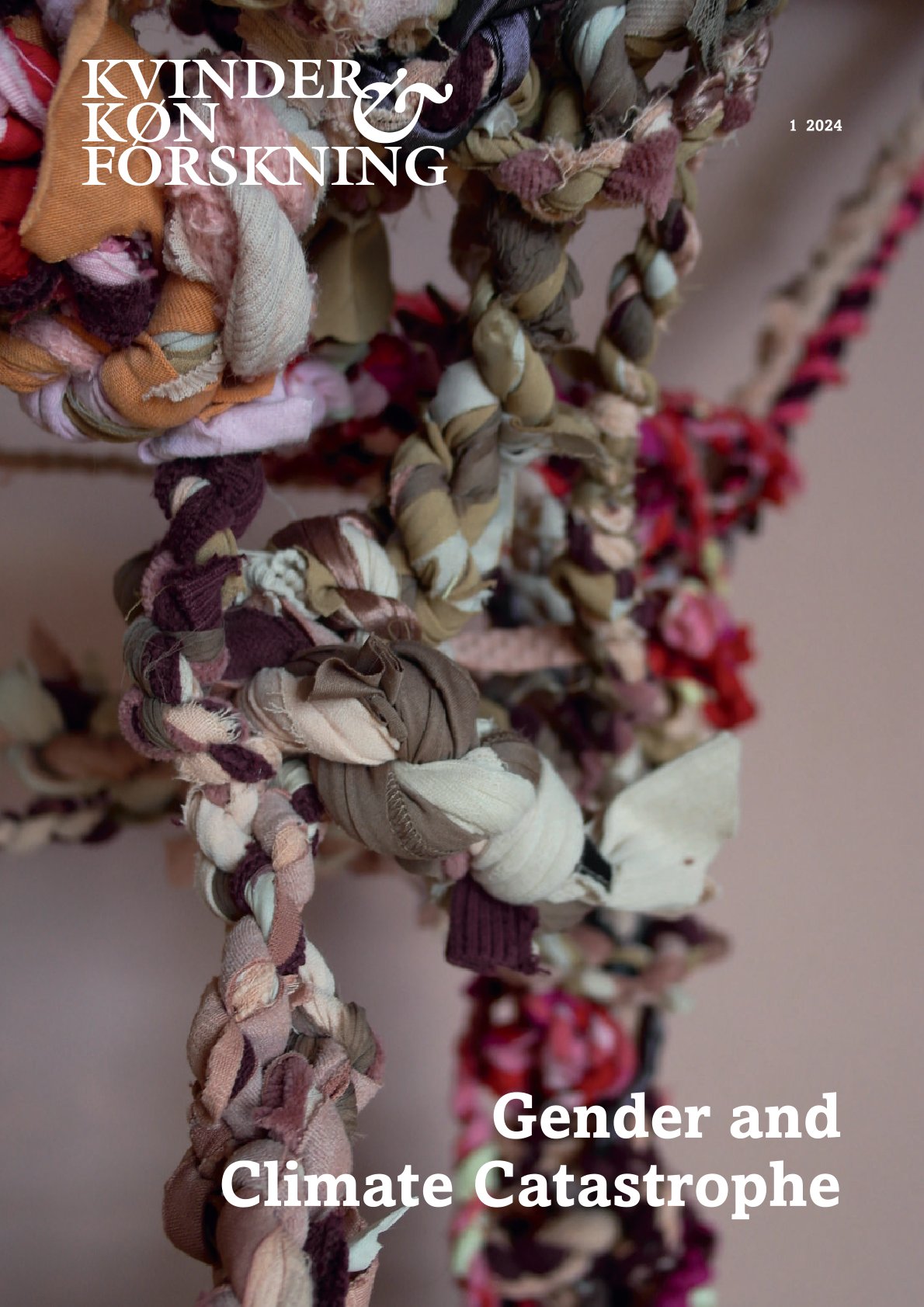The political economy of ecofeminist degrowth
DOI:
https://doi.org/10.7146/kkf.v37i1.143582Resumé
Socio-ecological crises pose numerous problems for the continuity of human communities and more-than-human beings. First, previous thinkers have shown how capitalism is married to continuous economic growth, which has led to overproduction and overconsumption. Second, ecofeminists point out that not everyone is responsible for these crises. Furthermore, dualist and hierarchical mindsets perpetuate the exploitation of women, minorities, and more-than-human beings. Bridging these two debates is important to dismantling gendered economic exploitation on the one hand and the capitalist growth economy on the other. This text briefly introduces the history of ecofeminism and the ecofeminist political economy. It also identifies themes in ecofeminist degrowth thinking by analysing the works of Ariel Salleh and Stefania Barca. It is important to highlight ecofeminist thinking so that current degrowth debates do not ignore the institutionalised exploitation of women, minorities, and other species in economic activity.
Referencer
Agarwal, Bina. 1992. The gender and environment debate: lessons from India. Feminist Studies, 18:1, 119–158. https://doi.org/10.2307/3178217
Agarwal, Bina. 1998. Environmental management, equity and ecofeminism: debating India’s experience. Journal of Peasant Studies, 25:4, 55–95. https://doi.org/10.1080/03066159808438684
Barca, Stefania. 2019. The labor(s) of degrowth. Capitalism Nature Socialism, 30:2, 207–216. https://doi.org/10.1080/10455752.2017.1373300
Barca, Stefania. 2020. Forces of reproduction: Notes for a counter-hegemonic Anthropocene. 1. painos. Cambridge: Cambridge University Press.
Barca, Stefania, Chertkovskaya, Ekaterina and Paulsson, Alexander. 2019. Introduction. The end of political economy as we knew it? From growth realism to nomadic utopianism. In Ekaterina Chertkovskaya, Alexander Paulsson and Stefania Barca (Eds.), Towards a political economy of degrowth. Lontoo: Rowman & Littlefield Publishers, 1–18.
Buch-Hansen, Hubert. 2018. The prerequisites for a degrowth paradigm shift: insights from critical political economy. Ecological Economics, 146, 157–163. https://doi.org/10.1016/j.ecolecon.2017.10.021
Dengler, Corinna and Lang, Miriam. 2021. Commoning care: feminist degrowth visions for a socio-ecological transformation. Feminist Economics, 28:1, 1–28. https://doi.org/10.1080/13545701.2021.1942511
Dengler, Corinna and Strunk, Birte. 2018. The monetized economy versus care and the environment: degrowth perspectives on reconciling an antagonism. Feminist Economics, 24:3, 160–183. https://doi.org/10.1080/13545701.2017.1383620
Elomäki, Anna and Ylöstalo, Hanna. 2020. Feministisempää poliittisen talouden tutkimusta. Poliittinen talous, 8:1, 87–99. https://doi.org/10.51810/pt.101636
FaDA. 2020. Collaborative feminist degrowth: Pandemic as an opening for a care-full radical transformation. Degrowth. https://degrowth.info/en/blog/collective-research-notebook [Luettu 1.5.2020]
Gaard, Greta. 2011. Ecofeminism revisited: Rejecting essentialism and re-placing species in a material feminist environmentalism. Feminist Formations, 23:2, 26–53.
Gaard, Greta. 2015. Ecofeminism and climate change. Women’s Studies International Forum, 49, 20–33. https://doi.org/10.1016/j.wsif.2015.02.004
Gregoratti, Catia and Raphael, Riya. 2019. The historical roots of a feminist “degrowth”: Aria Mies’s and Marilyn Waring’s critiques of growth. In Ekaterina Chertkovskaya, Alexander Paulsson and Stefania Barca (Eds.), Towards a political economy of degrowth. Lontoo: Rowman & Littlefield Publishers, 83–98.
ISEE & Degrowth Conference 2021. 2021. Plenary: Mainstreaming a new economics: Levers for change in a post-COVID economic recovery. https://youtu.be/2tN_kqrIxlg [Viitattu 26.11.2021]
Kallis, Giorgos, Kerschner, Christian and Martinez-Alier, Joan. 2012. The economics of degrowth. Ecological Economics, 84, 172–180. https://doi.org/10.1016/j.ecolecon.2012.08.017
Kohtuusliike. 2021. Kohtuusliike. https://kohtuusliike.fi [Luettu 26.11.2021]
MacGregor, Sherilyn. 2017. Gender and environment: An introduction. In Sherilyn MacGregor (Ed.), Routledge handbook of gender and environment. Lontoo: Routledge, 1–24.
Mellor, Mary. 2006. Ecofeminist political economy. International Journal of Green Economics, 1:1–2, 139–150. https://doi.org/10.1504/IJGE.2006.009341
Mellor, Mary. 2017. Ecofeminist political economy: A green and feminist agenda. In Sherilyn MacGregor (Ed.), Routledge handbook of gender and environment. Lontoo: Routledge, 86–100.
Mies, Maria and Shiva, Vandana. 2014. Ecofeminism. Lontoo: Zed Books.
Mikola, Elina and Saikkonen, Enni. 2020. Conference Report – Beyond Growth – Indicators and politics for people and planet. https://fingo.fi/wp-content/uploads/2020/10/beyondgrowth_raportti_web.pdf [Luettu 20.5.2021]
Muraca, Barbara. 2012. Towards a fair degrowth-society: justice and the right to a ‘good life’ beyond growth. Futures, 44:6, 535–545. https://doi.org/10.1016/j.futures.2012.03.014
Oksala, Johanna. 2018. Feminism, capitalism, and ecology. Hypatia, 33:2, 216–234. https://doi.org/10.1111/hypa.12395
Paulson, Susan. 2017. Degrowth: culture, power and change. Journal of Political Ecology, 24:1, 425–448. https://doi.org/10.2458/v24i1.20882
Paulson, Susan, Dengler, Corinna, Gerner, Nadine, Sonetti Gonzalez, Taiz, Hansen, Lina, Mookerjea, Sourayan and Saave, Anna. 2023. Why are feminist perspectives, analyses and actions vital to degrowth? Degrowth.
Plumwood, Val. 2002. Environmental culture: the ecological crisis of reason. Lontoo: Routledge.
Rockström, Johan, Steffen, Will, Noone, Kevin, Persson, Åsa, Chapin, Stuart F., Lambin, Eric F., Lenton, Timothy M, Scheffer, Marten, Folke, Carl, Schellnhuber, Hans Joachim, Nykvist, Björn, de Wit, Cynthia A., Hughes, Terry, Leeuw, Sander van der, Rodhe, Henning, Sörlin, Sverker, Snyder, Peter K., Costanza, Robert, Svedin, Uno, Falkenmark, Malin, Karlberg, Louise, Corell, Robert W., Fabry, Victoria J., Hansen, James, Walker, Brian, Liverman, Diana, Richardson, Katherine, Crutzen, Paul and Foley, Jonathan A. 2009. A safe operating space for humanity. Nature, 461, 472–475. https://doi.org/10.1038/461472a
Saave, Anna and Muraca, Barbara. 2021. Rethinking labour/work in a degrowth society. In Nora Räthzel, Dimitris Stevis and David Uzzell (Eds.), The Palgrave handbook of environmental labour studies. Cham: Springer Nature Switzerland AG, 743–767.
Salleh, Ariel. 2009. Ecological debt: embodied debt. In Ariel Salleh (Ed.), Eco-sufficiency & global justice. Women write political ecology. (pp. 1–40). Lontoo: Pluto Press, 1–40.
Salleh, Ariel. 2017. Ecofeminism as politics: nature, Marx, and the postmodern. 2. painos. Lontoo: Zed Books.
Sturgeon, Noël. 1997. Ecofeminist natures: race, gender, feminist theory and political action. Lontoo: Routledge.
Warren, Karen. J. 2000. Ecofeminist philosophy: a western perspective on what it is and why it matters. Lanham, MD: Rowman & Littlefield Publishers.
Downloads
Publiceret
Citation/Eksport
Nummer
Sektion
Licens
Copyright (c) 2024 Eeva Houtbeckers

Dette værk er under følgende licens Creative Commons Navngivelse –Ikke-kommerciel (by-nc).
Udgivelser i Kvinder, Køn og Forskning er beskyttet under Creative Commons License: CC Attribution-NonCommercial 4.0

